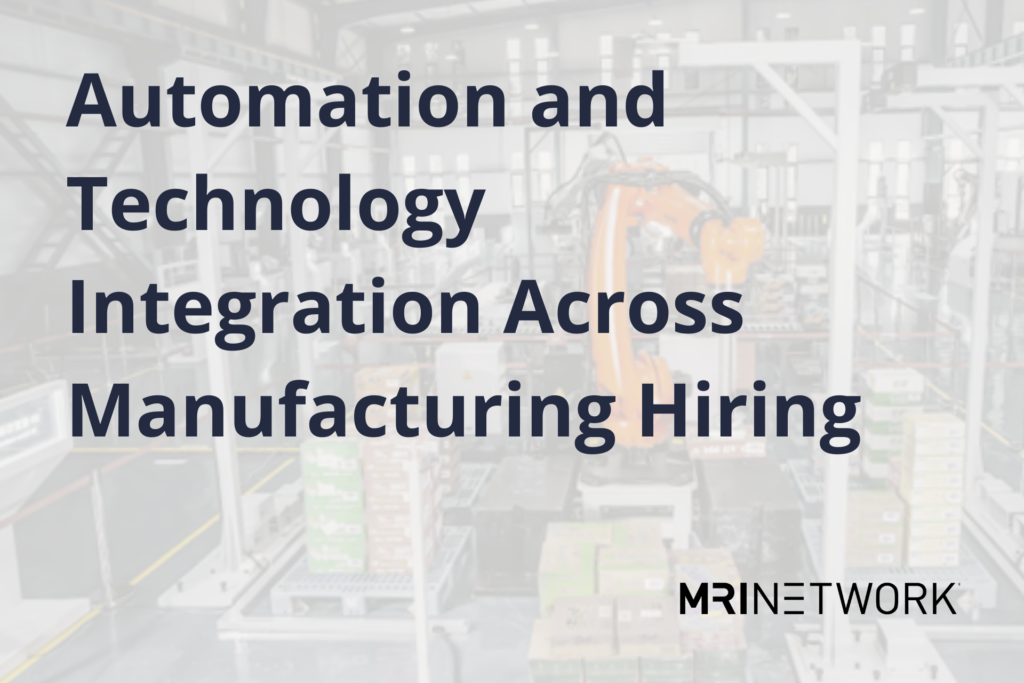Like most areas of industry, the manufacturing sector has shifted dramatically since 2020. Global disruption from various factors has caused manufacturers to look to technological solutions to streamline their processes and protect their employees. Automation, robotics, and advanced manufacturing technologies help organizations stay ahead of competitors in this rapidly evolving landscape. But, without talent that understands these types of tech, manufacturing enterprises can get left in the dust.
HR directors need to look at their current manufacturing hiring practices and understand if they’re attracting the right talent, and how to make the right transformation to ensure their organization is fit for the future.
Manufacturing Growth Via Technology
The manufacturing workforce is steadily decreasing, and as of 2022, only 12.6 million people work in manufacturing in the United States (CBInsights, 2022). While some of this is due to manufacturing shifting overseas to countries like China, another driving factor is the changing ways that manufacturing facilities produce goods. Automation in manufacturing means fewer manual checks and measures are required. Robotics handle dangerous or repetitive jobs that used to be in the remit of humans.
As skilled factory workers age and retire, there’s a fear that there are fewer skilled employees to replace them. However, if manufacturing hiring practices are adjusted to focus on talent familiar with these new innovations, organizations could reap the benefits.
Data skills are also vital for manufacturers. Supply and demand are more complex to understand than ever, especially with ongoing challenges surrounding supply chain logistics. Employees or leaders that are comfortable with business intelligence tools, data integration, and in-depth data analysis could help manufacturers manage and boost their bottom line. Growth is only possible if you avoid stagnation, and hiring tech experts keeps you ahead of the curve.
Future-Proofing Your Manufacturing Hiring Practices
Recruiting for manufacturing technology roles doesn’t need to be prohibitively challenging. While previous manufacturing hiring practices may have focused solely on practical, hands-on skills, new outlooks need to consider not only the data and tech skills required for now, but what might be needed later down the line.
This is a vital consideration as the world of manufacturing tech evolves so quickly. IoT (Internet of Things) sensors and remote activation of equipment in hazardous environments are becoming increasingly commonplace. While those technologies require fewer employees on the factory floor, what they do need is knowledgeable tech experts to set up, maintain, and understand the input from these devices. As AI and machine learning start to move into the realm of manufacturing, you want people who are open-minded to possible quite drastic change within the working environment. This might mean working with a completely different recruitment model from the one your HR teams are used to. Consider onboarding external experts to help you make the necessary shifts to gain and retain top talent that can drive your organization into the future.
From product assembly to packing and shipping, robotics and automation in manufacturing are now a familiar part of many facilities. However, hiring the right talent can seem tough in a highly competitive market. Applicants can demand high salaries, especially in roles such as leadership, programming, or analytics. Manufacturing organizations need to be open to making big investments in the right talent, then nurturing that talent so that the risk of employee churn is low. Protect your acquisitions by providing your people with learning and development opportunities, great benefits, and a promising career trajectory.
Investing in the right people now could position your company as the place to work for tech-savvy staff. As manufacturing technology advances, the right people give your organization the best chance at sustainable growth.
Follow MRINetwork for more insights into the future of hiring and challenges across a variety of industries.

Connect with MRINetwork